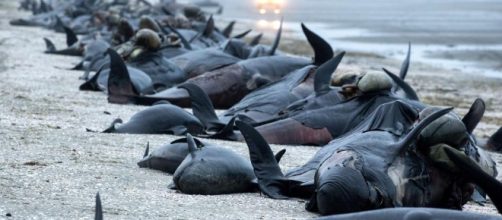On Monday, conservation authorities in New Zealand were cutting holes into approximately 300 dead whales to prevent them from exploding on the beaches of farewell spit after the largest recorded mass stranding of pilot whales in New Zealand. The stranding first occurred on February 9th when a pod of 400 whales were found on the beach. Approximately half of the whales died while the Department of Conservation (DOC) and volunteers tried to refloat the surviving whales back to the water. Another 200 more whales from another pod were stranded the next day.
What causes a dead whale to explode?
Darren Grover, General Manager of Project Jonah, a volunteer organization responding to whale stranding in New Zealand, explained at a press conference why cutting holes was necessary in the process of de-gassing a whale. "As whales decompose, gases build up in their bodies and there is a chance there will be eruptions of those whales," Mr Grover said.
Dr. Joe Gaydos, director and chief scientist of the SeaDoc Society at the University of Washington said to Wired's Sarah Zhang,“The carcasses for a homeowner, it’s like Nightmare on Elm Street, but for animals, it’s like manna on Earth." When a whale dies in the ocean, its carcass sinks to the bottom and the decomposition may take decades with sharks, fish, and worms eating it.
However, when a whale dies on the beach, gas buildup in its stomach and intestines during decomposition could cause the whale carcass to explode. The smell alone from a decomposing whale carcass beached on land is overwhelming, and more so if its inner guts explode all over the beach which is why steps are taken to prevent the whales from exploding. What exactly does a decomposing whale smell like? Gaydos said: "It’s an oily dead smell. It can stick to you. My kids will be like, ‘You were at a necropsy’ and I’d be like, ‘Really? I’ve taken a shower.'"
Farewell Spit known as a whale trap
Stranded whales on Farewell Spit shores are not new. Although no one knows what caused the latest mass whale stranding, the shallow waters can confuse a whale's sonar sound locator, guiding it toward instead of away from land.
According to CNN, the previous largest whale stranding in New Zealand occurred in 1918 when 1,000 whales were beached on Chatham Islands. DOC said that other factors can cause whale beachings, such as a whale pod following a diseased member because of strong social bonds.
According to the DOC, on Sunday, the surviving whales were last seen swimming 6 kms (four miles) off the coast.
The carcasses of hundreds of dead whales stranded on a New Zealand beach are being punctured to stop them exploding https://t.co/7J30Np7tzR
— CNN (@CNN) February 13, 2017
400+ pilot whales stranded at Farewell Spit, #NewZealand, approx 300 thought to have died https://t.co/bOttl83vgl #dolphins #strandings pic.twitter.com/DYLo5NAcH5
— Marine Connection (@MC_org) February 9, 2017

